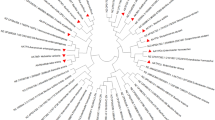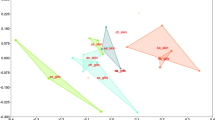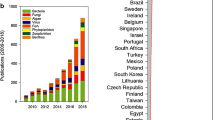Abstract
Homeostasis of gut microbiota is critical for growth and health of animals. However, the impact of reproduction on penguin gut microbiota remains unclear, despite penguins being sentinel species of the marine environment. Through high-throughput sequencing of 16S rRNA gene, we examined changes in gut microbiota structure and function in captive female Gentoo penguins during the reproductive process, and also assessed the community stability and assembly mechanism. We found that gut microbiota alpha diversity decreased significantly in captive female Gentoo penguins after egg laying. Based on the comparison of gut microbiota compositions and their predicted functions, the Fusobacteria and pathogenicity increased after laying eggs, while Bacteroidetes and carbohydrate metabolism decreased. After laying eggs, the diversity of the gut microbiota decreased continuously until chicks left the nest. The co-occurrence network analysis revealed that the gut microbiota of captive female Gentoo penguins was less complex and more stable after egg laying. On the basis of the null model, deterministic processes drove the gut microbiota assembly in gravid Gentoo penguins, whereas reproductive processes elevated the contribution of stochastic processes. Our study provides insights into the reproductive physiology and gut microbiota assembly in penguins.






Similar content being viewed by others
Data availability
The abundance tables of bacterial ASVs and predicted functions have been uploaded to Figshare: https://doi.org/10.6084/m9.figshare.22591381.
References
Banks JC, Craig S, Cary I, Hogg D (2009) The phylogeography of Adelie penguin fecal flora. Environ Microbiol 11:577–588. https://doi.org/10.1111/j.1462-2920.2008.01816.x
Barbosa A, Balagué V, Francisco V, Martínez A, Benzal J, Motas M, Diaz JI, Mira A, Pedrós-Alió C (2016) Age-related differences in the gastrointestinal microbiota of Chinstrap penguins (Pygoscelis antarctica). PLoS ONE 11:e0153215. https://doi.org/10.1371/journal.pone.0153215
Berg J, Brandt KK, Al-Soud WA, Holm PE, Hansen LH, Sørensen SJ, Nybroe O (2012) Selection for Cu-tolerant bacterial communities with altered composition, but unaltered richness, via long-term Cu exposure. Appl Environ Microbiol 78:7438–7446. https://doi.org/10.1128/AEM.01071-12
Bokulich NA, Kaehler BD, Rideout JR, Dillon M, Bolyen E, Knight R, Huttley GA, Caporaso JG (2018) Optimizing taxonomic classification of marker-gene amplicon sequences with qiime 2’s q2-feature-classifier plugin. Microbiome 6:90. https://doi.org/10.1186/s40168-018-0470-z
Burns AR, Stephens WZ, Stagaman K, Wong S, Rawls JF, Guillemin K, Bohannan BJ (2016) Contribution of neutral processes to the assembly of gut microbial communities in the zebrafish over host development. ISME J 10:655–664. https://doi.org/10.1038/ismej.2015.142
Carding S, Verbeke K, Vipond DT, Corfe BM, Owen LJ (2015) Dysbiosis of the gut microbiota in disease. Microb Ecol Health Dis 26(1):26191. https://doi.org/10.3402/mehd.v26.26191
Castellarin M, Warren RL, Freeman JD, Dreoloni L, Krzywinski M, Staruss J, Barnes R, Watson P, Allen-Vercoe E, Moore RA (2012) Fusobacterium nucleatum infection is prevalent in human colorectal carcinoma. Genome Res 22:299–306. https://doi.org/10.1101/gr.126516.111
Chen CY, Chen CK, Chen YY, Fang A, Shaw GTW, Hung CM, Wang D (2020) Maternal gut microbes shape the early-life assembly of gut microbiota in passerine chicks via nests. Microbiome 8(1):1–13. https://doi.org/10.1186/s40168-020-00896-9
Collins CK, Quirke T, Overy L, Flannery K, O’Riordan R (2016) The effect of the zoo setting on the behavioural diversity of captive Gentoo penguins and the implications for their educational potential. J Zoo Aquar Res 4(2):85–90. https://doi.org/10.19227/jzar.v4i2.158
Dewar ML, Arnould JPY, Dann P, Trathan P, Groscolas R, Smith S (2013) Interspecific variations in the gastrointestinal microbiota in penguins. MicrobiologyOpen 22:195–204. https://doi.org/10.1002/mbo3.66
Dewar ML, Arnould JPY, Allnutt TR, Crowley T, Krause L, Reynolds J, Dann P, Smith S (2017) Microbiota of little penguins and short-tailed shearwaters during development. PLoS ONE 12:e0183117. https://doi.org/10.1371/journal.pone.0183117
Dixon P (2003) VEGAN, a package of R functions for community ecology. J Vegeta Sci 14(6):927–930. https://doi.org/10.1111/j.1654-1103.2003.tb02228.x
Douglas GM, Maffei VJ, Zaneveld JR, Yurgel SN, Brown JR, Taylor CM, Huttenhower C, Langille MGI (2020) PICRUSt2 for prediction of metagenome functions. Nat Biotechnol 38:685–688. https://doi.org/10.1038/s41587-020-0548-6
Estrada-Velasco BI, Cruz M, Garcia-Mena J, Valladares Salgado A, Peralta Romero J, Guna Serrano Mde L, Madrid-Marina V, Orbe Orihuela C, Lopez Islas C, Burguete-Garcia AI (2015) Childhood obesity is associated to the interaction between Firmicutes and high energy food consumption. Nutr Hosp 31:1074–1081. https://doi.org/10.3305/nh.2015.31.3.8302
Garber A, Hastie P, Murray JA (2020) Factors influencing equine gut microbiota: current knowledge. J Equine Vet Sci 88:102943. https://doi.org/10.1016/j.jevs.2020.102943
Godoy-Vitorino F, Rodriguez-Hilario A, Alves AL, Gonçalves F, Cabrera-Colon B, Mesquita CS, Soares-Castro P, Ferreira M, Marcalo A, Vingada J, Eira C, Santos PM (2017) The microbiome of a striped dolphin (Stenella coeruleoalba) stranded in Portugal. Res Microbiol 168:85–93. https://doi.org/10.1016/j.resmic.2016.08.004
Graciette AGC, Hoopes LA, Clauss T, Stewart FJ, Pratte ZA (2023) The microbiome of African penguins (Spheniscus demersus) under managed care resembles that of wild marine mammals and birds. Sci Rep 13(1):16679. https://doi.org/10.1038/s41598-023-43899-w
Grond K, Sandercock BK, Jumpponen A, Zeglin LH (2018) The avian gut microbiota: community, physiology and function in wild birds. J Avian Biol 49(11):e01788. https://doi.org/10.1111/jav.01788
Groscolas R, Robin JP (2001) Long-term fasting and re-feeding in penguins. Comp Biochem Phys A 128(3):643–653. https://doi.org/10.1016/S1095-6433(00)00341-X
Jiang J (2023) Composition, diversity and sex-related differences in intestinal microbiota in captive African penguins (Spheniscus demersus). Animals 13(13):2106. https://doi.org/10.3390/ani13132106
Jiang J, Hu D, Pei E (2024) Integrated omics analysis reveals a correlation between gut microbiota and egg production in captive African penguins (Spheniscus demersus). Anim Reprod Sci 263:107448. https://doi.org/10.1016/j.anireprosci.2024.107448
Kollarcikova M, Kubasova T, Karasova D, Crhanova M, Cejkova D, Sisak F, Rychlik I (2019) Use of 16S rRNA gene sequencing for prediction of new opportunistic pathogens in chicken ileal and cecal microbiota. Poultry Sci 98(6):2347–2353. https://doi.org/10.3382/ps/pey594
Kong Z, Wei T, Liu B, Li Y, Wang Y, Ma Z, Tian J, Li Y (2023) Diel modifications in the oral and anal microflora of the Pygoscelis papua Penguins. Biol Rhythm Res 54(3):351–368. https://doi.org/10.1080/09291016.2023.2185388
Langfelder P, Horvath S (2008) WGCNA: an R package for weighted correlation network analysis. BMC Bioinform 9:1–13. https://doi.org/10.1186/1471-2105-9-559
Lattin CR, Romero LM (2014) Chronic stress alters concentrations of corticosterone receptors in a tissue-specific manner in wild house sparrows (Passer domesticus). J Exp Biol 217(14):2601–2608.
Ley RE, Turnbaugh PJ, Klein S, Gordon JI (2006) Microbial ecology: human gut microbes associated with obesity. Nature 444:1022–1023. https://doi.org/10.1038/4441022a
Liao XD, Ma G, Cai J, Fu Y, Yan XY, Wei XB, Zhang RJ (2015) Effects of Clostridium butyricum on growth performance, antioxidation, and immune function of broilers. Poultry Sci 94(4):662–667. https://doi.org/10.3382/ps/pev038
Liu Y, Sanderson D, Mian MF, Neufeld KAM, Forsythe P (2021) Loss of vagal integrity disrupts immune components of the microbiota-gut-brain axis and inhibits the effect of Lactobacillus rhamnosus on behavior and the corticosterone stress response. Neuropharmacology 195:108682. https://doi.org/10.1016/j.neuropharm.2021.108682
Lozupone CA, Stombaugh JI, Gordon JI, Jansson JK, Knight R (2012) Diversity, stability and resilience of the human gut microbiota. Nature 489(7415):220–230. https://doi.org/10.1038/nature11550
Nakayama J, Yamamoto A, Palermo-Conde LA, Higashi K, Sonomoto K, Tan J, Lee YK (2017) Impact of westernized diet on gut microbiota in children on Leyte Island. Front Microbiol 8:197. https://doi.org/10.3389/fmicb.2017.00197
Nelson TM, Rogers TL, Carlini AR, Brown MV (2013) Diet and phylogeny shape the gut microbiota of Antarctic seals: a comparison of wild and captive animals. Environ Microbiol 15:1132–1145. https://doi.org/10.1111/1462-2920.12022
Reilly P (1994) Penguins of the world. Oxford University Press, Oxford
Roeder AD, Ritchie PA, Lambert DM (2002) New DNA markers for penguins. Conserv Genet 3:341–344. https://doi.org/10.1023/A:1019982009059
Rohrer SD, Jiménez-Uzcátegui G, Parker PG, Chubiz LM (2023) Composition and function of the Galapagos penguin gut microbiome vary with age, location, and a putative bacterial pathogen. Sci Rep 13(1):5358. https://doi.org/10.1038/s41598-023-31826-y
Rothschild D, Weissbrod O, Barkan E, Kurilshikov A, Korem T, Zeevi D, Costea PI, Godneva A, Kalka IN, Bar N, Shilo S, Lador D, Vila AV, Zmora N, Pevsner-Fischer M, Israeli D, Kosower N, Malka G, Wolf BC, Avnit-Sagi T, Lotan-Pompan M, Weinberger A, Halpern Z, Carmi S, Fu J, Wijmenga C, Zhernakova A, Elinav E, Segal E (2018) Environment dominates over host genetics in shaping human gut microbiota. Nature 555:210–215. https://doi.org/10.1038/nature25973
Smith SC, Chalker A, Dewar ML, Arnould JP (2013) Age-related differences revealed in Australian fur seal Arctocephalus pusillus doriferus, gut microbiota. FEMS Microbiol Ecol 86:246–255. https://doi.org/10.1111/1574-6941.12157
Stegen JC, Lin X, Fredrickson JK, Chen X, Kennedy DW, Murray CJ, Rockhold ML, Konopka A (2013) Quantifying community assembly processes and identifying features that impose them. ISME J 7(11):2069–2079. https://doi.org/10.1038/ismej.2013.93
Stonehouse B (1975) The biology of penguins. University Park Press, State College
Thursby E, Juge N (2017) Introduction to the human gut microbiota. Biochem J 474(11):1823–1836. https://doi.org/10.1042/BCJ20160510
Tian J, Du J, Han J, Wang Z, Fu Z, Lu Z (2020) Gut microbiota variations in a rescued spotted seal Phoca largha pup. Aquat Biol 29:105–109. https://doi.org/10.3354/ab00729
Tian J, Du J, Lu Z, Li Y, Li D, Han J, Wang Z, Guan X (2021a) Differences in the fecal microbiota due to the sexual niche segregation of captive Gentoo penguins Pygoscelis papua. Polar Biol 44(3):473–482. https://doi.org/10.1007/s00300-021-02812-9
Tian J, Du J, Zhang S, Li Y, Gao X, Han J, Lu Z (2021b) Age-associated variation in the gut microbiota of chinstrap penguins (Pygoscelis antarctica) reveals differences in food metabolism. MicrobiologyOpen 10(2):e1190. https://doi.org/10.1002/mbo3.1190
Tian J, Sanganyado E, Wang Z, Kong Z, Han J, Lu Z, Liu W (2022) Spotted seals (Phoca largha) harbor unique gut microbiota shaped by their host habitat. Sci Total Environ 832:155015. https://doi.org/10.1016/j.scitotenv.2022.155015
Vianna JA, Noll D, Mura-Jornet I, Valenzuela-Guerra P, González-Acuña D, Navarro C, Loyola DE, Dantas GPM (2017) Comparative genome-wide polymorphic microsatellite markers in Antarctic penguins through next generation sequencing. Genet Mol Biol 40(3):676–687. https://doi.org/10.1590/1678-4685-GMB-2016-0224
Wickham H (2016) ggplot2: elegant graphics for data analysis. Springer, New York
Williams TD (1995) The penguins; Spheniscidae. Oxford University Press, Oxford
Yadav S, Jha R (2019) Strategies to modulate the intestinal microbiota and their effects on nutrient utilization, performance, and health of poultry. J Anim Sci Biotechnol 10(1):1–11. https://doi.org/10.1186/s40104-018-0310-9
Yoon K, Kim N (2021) Roles of sex hormones and gender in the gut microbiota. J Neurogastroenterol 27(3):314. https://doi.org/10.5056/jnm20208
Yuan MM, Guo X, Wu L, Zhang YA, Xiao N, Ning D, Shi Z, Zhou X, Wu L, Yang Y, Tiedje JM, Zhou J (2021) Climate warming enhances microbial network complexity and stability. Nat Clim Change 11(4):343–348. https://doi.org/10.1038/s41558-021-00989-9
Yukgehnaish K, Kumar P, Sivachandran P, Marimuthu K, Arshad A, Paray BA, Arockiaraj J (2020) Gut microbiota metagenomics in aquaculture: factors influencing gut microbiome and its physiological role in fish. Rev Aquacult 12(3):1903–1927. https://doi.org/10.1111/raq.12416
Zhang L, Li J, Yun TT, Qi WT, Liang XX, Wang YW, Li AK (2015) Effects of pre-encapsulated and pro-encapsulated Enterococcus faecalis on growth performance, blood characteristics, and cecal microflora in broiler chickens. Poultry Sci 94(11):2821–2830. https://doi.org/10.3382/ps/pev262
Zhou Y, Li Y, Zhang L, Wu Z, Huang Y, Yan H, Zhong J, Wang L, Abdullah HM, Wang HH (2020) Antibiotic administration routes and oral exposure to antibiotic resistant bacteria as key drivers for gut microbiota disruption and resistome in poultry. Front Microbiol 11:1319. https://doi.org/10.3389/fmicb.2020.01319
Acknowledgements
This work was supported by the Dalian Science and Technology Innovation Fund Project (2022JJ13SN065), the China Environment and Zoology Protection for Offshore Oil and Ocean Foundation (CF-MEEC/ER/2021-15 and CF-MEEC/TR/2022-11), and the Foundation of Liaoning Province Department of Ocean and Fisheries (201812 and 201822).
Author information
Authors and Affiliations
Contributions
Jiashen Tian: methodology, formal analysis, investigation, and writing original draft. Edmond Sanganyado, Yanqiu Li, and Duohui Li: methodology, formal analysis, and resources. Xianggang Gao: supervision. Zhichuang Lu: conceptualization, funding acquisition, project administration, Writing—review and editing. Wenhua Liu: conceptualization, project administration, and writing—review and editing. All authors read and approved the manuscript.
Corresponding authors
Ethics declarations
Competing interest
The authors declare no competing interests.
Ethical approval
This study was authorized by the Dalian Sun Asia Aquarium. No animals were directly involved.
Additional information
Publisher's Note
Springer Nature remains neutral with regard to jurisdictional claims in published maps and institutional affiliations.
Supplementary Information
Below is the link to the electronic supplementary material.
Rights and permissions
Springer Nature or its licensor (e.g. a society or other partner) holds exclusive rights to this article under a publishing agreement with the author(s) or other rightsholder(s); author self-archiving of the accepted manuscript version of this article is solely governed by the terms of such publishing agreement and applicable law.
About this article
Cite this article
Tian, J., Sanganyado, E., Li, D. et al. Changes of gut microbiota diversity and stability over the reproduction process in captive female Gentoo penguins (Pygoscelis papua). Polar Biol (2024). https://doi.org/10.1007/s00300-024-03260-x
Received:
Revised:
Accepted:
Published:
DOI: https://doi.org/10.1007/s00300-024-03260-x




